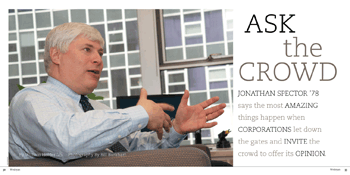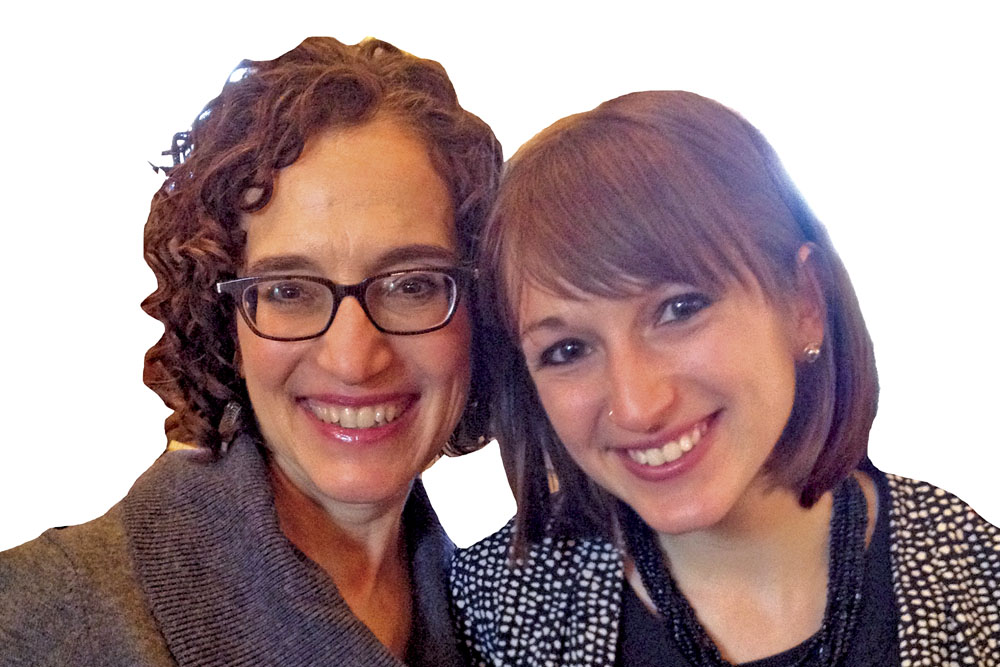Ask the Crowd
 Jonathan Spector ’78, chief executive officer of the Conference Board, has a story he likes to tell that contains a revolutionary message for American business.
Jonathan Spector ’78, chief executive officer of the Conference Board, has a story he likes to tell that contains a revolutionary message for American business.
A mining company called Goldcorp had worked an area until it appeared to be depleted. Company officials weren’t quite ready to give up, so they took a highly unusual step. They published their proprietary geologic maps on the Internet and invited anyone to suggest where more gold might be found.
They struck it rich with suggestions that enabled them to extract another $3 billion in gold, and they happily paid out a $500,000 reward. “It’s an extraordinary example,” says Spector, “of how the unknown crowd of people out there was able to discern information that the limited number of experts at the company was not able to do.”
The power of many is far greater than the power of one, or a few. That’s the message of Spector’s recent book, coauthored with Barry Libert, We Are Smarter Than Me. Business is just beginning to understand how to use the power of “we,” he says. From giants like Procter & Gamble, which is deriving 30 percent of its R&D ideas from outsiders, to Wikipedia, which nearly defined the concept of outsourcing to the crowd, to Cookshack, a maker of barbecue ovens that relies on customer online forums to create a body of knowledge about barbecue techniques, the realization that crowds know a lot is catching hold.
We Are Smarter Than Me is itself the product of an experiment in tapping the wisdom of crowds. Spector and Libert decided theirs would be the first book to be written by crowdsourcing. After working through issues related to intellectual property, they set up a Web site and almost immediately gained a following of 3,000 individuals. The community provided insights and the raw material for the book, though in the end the authors found they had to write the manuscript in the conventional way. The crowd does have its limitations.
Spector has only to look out his third-floor window to find a crowd down on Third Avenue in New York. Tapping the wisdom of crowds, however, hinges on the culture of the Web and online social networking that has grown rapidly in the past few years. He points out that although a few other countries have a better information technology infrastructure than the United States, we use the Web more intensively than most.
One of the pioneers of crowdsourcing was
Amazon.com. Early on, founder Jeff Bezos established online customer reviews, but in 2004 he took the more radical step of opening Amazon’s proprietary databases of sales and inventory information as a way of entering into partnerships with savvy outsiders. More than 240,000 people have participated in Amazon Web Services, and this method of crowdsourcing has become part of Amazon’s core business strategy.
More recently, Apple Computer discovered the value of inviting the crowd in through the front door. Apple had at first closed its popular iPhone to outside developers, but when it changed that policy, a flood of individuals developed applications, and customer downloads recently passed the billion mark. Similar to other companies that have adopted crowdsourcing, Apple discovered that customers loved the result, much to the benefit of the product and its sales.
Evidence for creative business initiatives on the Web abound in his book, which Spector began when he was named vice dean and director of executive education at the Wharton School—after having headed several small startups and having served as a senior partner for McKinsey & Company. The segue to the Conference Board was a natural one because it is heavily involved in the education of corporate leadership, though it’s best known for its Consumer Confidence Index, the Leading Economic Indicators, and other reports on business trends. Spector is also a former Wesleyan trustee and holds an MBA from Harvard Business School.
The Conference Board will be providing guidance and insight to companies as they adapt to a potentially wrenching change in the U.S. economy. Consumer spending has been running at about 74 percent of GNP. Economists see that as an unsustainable, overheated pace that must drop back to about 68 percent. The difference may not seem huge, but measured in terms of economic activity, it’s enough to swallow some car companies and many other businesses as well.
Spector is anticipating a fundamental reorientation of the economy from one structured for a high growth rate of 5 to 7 percent toward one adapted to a much lower growth rate of 2.5 to 3 percent. Although corporate America is generally much leaner and more efficient than it was 25 years ago, companies will need every edge they can acquire if this prediction comes true. Crowdsourcing may help many. For some, it may mean the difference between survival and extinction.
Take newspapers, for example. The industry clearly is in a turmoil worsened but not caused by the recession. Spector is an avid reader of the New York Times—online—and that is the problem, as the industry sees it. Why pay for a product you can get for free?
The inability of newspapers to generate sufficient revenue from online readers is indisputably a source of difficulty, but Spector contends that newspapers face a more significant problem. The market for news is becoming ever more diverse and sliced into thin segments. In the pre-Web days, it didn’t matter so much. Readers had only so many choices for news. Now, news flows from and through the crowd online, which is replete with people who can offer knowledgeable commentary and editing. Newspapers cannot compete with the ability of the crowd to cater to an individual’s specific interests.
“The fundamental problem is not that there is another media and it’s better than paper,” says Spector. “It’s that the concept of a mass publication can’t meet the needs of its audience because the market is so diverse.
“The New York Times has a much bigger problem than a drop in ad revenue. The editor of the Times may be relevant for 70,000 people, but not for seven million people in New York. If the paper has to compete with several hundred thousand editors in the crowd who are gathering specialized news, there is nothing it can do to fix its economics.”
But wait. Doesn’t the Times provide trusted news (at least in comparison to many other sources)? How can the crowd insert a knowledgeable reporter with years of experience into Kabul or provide a columnist like Tom Friedman?
Spector believes the issue of trust, while significant, will be solved because other Web businesses have come up with viable solutions. For example, eBay addresses trust through its system of customer ratings of sellers, which is not perfect but does appear to be good enough for most buyers.
Tom Friedman may discover that he doesn’t need the Times to deliver his column to a large audience, although no system is currently in place that would mediate a financial transaction between him and his readers. Likewise, it’s not clear how to get credible reporting out of Kabul in the absence of mass media, but ingenuity may yet prevail. All this is speculative, of course, and newspapers may yet find a way of delivering their product electronically so that it will generate adequate revenue. Spector’s point is that the Times needs to worry less about CNN or the Wall Street Journal and more about the unseen aggregators of news on the Web who may be delivering a product to a woman on the Upper West Side that exactly meets her needs.
In journalism, the Times sets a standard for quality, but definitions of quality change, sometimes to the surprise of individuals who considered themselves invincible. For example, Spector recalls chatting several years ago with a senior executive from Polaroid, who dismissed the notion that digital photography would ever threaten the company and asserted that the quality of a Polaroid was much higher.
“He took a picture of me and dunked it in a cup of water. He said, ‘Look at this; it’s completely impervious to water.’ Two weeks ago, Polaroid was sold for the second time into bankruptcy. Here’s a business that disappeared because the definition of quality changed.”
In some areas, following the wisdom of crowds is easy. Knowing what other people think about movies and restaurants is interesting and possibly helpful, even if a consumer then turns to a critic or restaurant reviewer. Using the crowd to create an encyclopedia remains controversial, but in at least one respect Wikipedia has redefined quality. Studies show that errors in Wikipedia are corrected within minutes. Clearly, no print publication could come close to that standard.
Should we rely on the wisdom of crowds to diagnose our health problems? The suggestion sounds preposterous, and in some respects it is. No one who has a fever and persistent headache is going to rely on an uninformed crowd in favor of a skilled physician and maybe a lab test. Yet here, too, the crowd has its place, Spector contends. A person with a rare condition may find valuable information from an online crowd of fellow sufferers, some of whom may know more about that particular ailment than most doctors.
Spector is quick to acknowledge that efforts to tap crowds can go badly awry. The Los Angeles Times discovered this when it opened its editorial page online to contributions from the public. The result was banality and worse, and the experiment ended almost as soon as it began.
The quality of the community matters. Creating a community of people who are able and willing to help a company or an organization is not easy. The potential for mischief is considerable; the ability to control the conversation is largely absent and would be counterproductive anyway. No one wants to participate in a community dominated by corporate spin or obfuscation. Companies that open themselves to the crowd have to be responsive, honest, and willing to hear criticism. Failure on any of those counts, says Spector, is likely to result in being pilloried by an angry crowd.
The most significant ramifications of crowdsourcing may lie within companies themselves. Some companies, such as Netflix, are naturally adapted to the world of the crowd. Customer ratings are a keystone in its business model, so much so that Netflix has turned to the crowd and offered a $1 million reward to anyone who can improve on its Cinematch system, which helps customers find movies that are most likely to appeal to their tastes. For the head of product development at a cereal company, crowdsourcing presents a different challenge. Should he or she surrender to the wisdom of the crowd if it advocates prune cereal? Crowds can be wrong, after all.
As the world of social networking develops, change will come to different industries at different rates, depending on their ability to adapt. Spector and Libert foresee a growing trend toward collaboration in place of the traditional authoritarian corporate model. Individuals with expertise will move easily from one employer to another, and corporate loyalty will fade away. “Indeed, we believe that the corporation as it now exists, with its armies of salaried workers in identical cubicles, will gradually disappear,” they write. “Instead there will be virtual communities that will be able to mobilize teams of specialists to take on necessary tasks for customers.”

